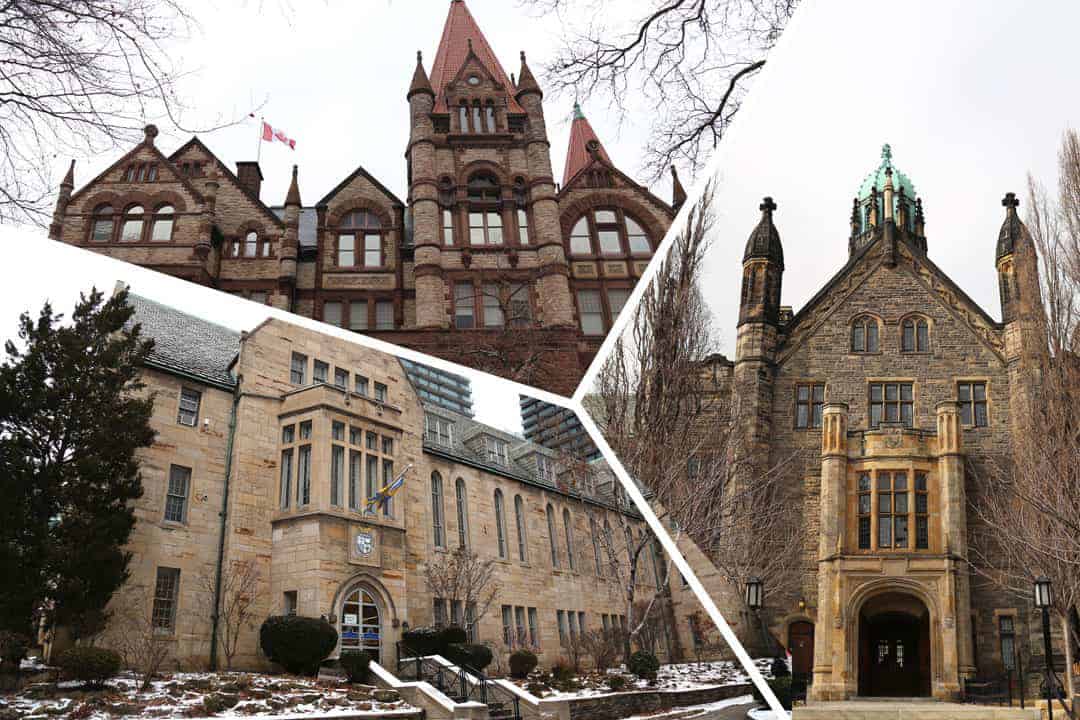In October 2021, U of T President Meric Gertler announced the university was divesting from direct investments in fossil fuel companies. According to the University of Toronto Asset Management Corporation, the university remains on track to divest from indirect investments by 2030.
By the end of September, the university’s three federated colleges — Victoria University, Trinity College, and University of St. Michael’s College (USMC) — had all committed to divesting their endowments from fossil fuel companies. The federated colleges have all undertaken more initiatives in the pursuit of sustainability. The Varsity has also looked into some of the non-federated colleges’ independent green initiatives.
Victoria College
In April, after student climate activists held an 18-day occupation of Victoria University’s “Old Vic” building, Victoria College committed to divesting its endowment fund from fossil fuel companies by 2030. On September 13, the college announced its intention to sell a property it owns in Weyburn, Saskatchewan that houses an active oil well.
Vic also reports on its website that it has carried out extensive renovations across its campus, including installing LED lights on an ongoing basis, replacing outdated ventilation systems, and enlarging recycling signage in Rowell Jackman Hall.
The Varsity travelled to Rowell Jackman Hall to investigate and found that one of the eight recycling rooms had been visibly refitted with a new plaque, roughly two inches larger than the old one.
In an email to The Varsity, a Victoria University spokesperson highlighted that the college plans to assess the feasibility of building a geothermal energy system on its campus.
St. Michael’s College
In June, USMC pledged to fully divest from fossil fuel companies by 2030. On its website, the college wrote that it hopes to use its investment portfolio to “nudge” corporate Canada toward action on climate change.
USMC has made environmental renovations in many of its buildings, installing LED lights and energy-efficient windows throughout campus as well as eight waterless urinals in Elmsley Hall.
The college is also focused on waste reduction initiatives, such as more efficient recycling. In 2021, it reported that the material it had diverted from landfill that year weighed the same as 43 Tesla Model S vehicles.
The college also hopes to incorporate sustainability into its purchasing decisions. When ordering new furniture for Brennan Hall, it originally chose to source furniture options from the US, but when this order was delayed, it found Canadian-made furniture — which, according to the college, cut costs and the negative environmental impacts of a delivery haul.
On its website, USMC cites the pope’s call to “establish new relationships with the environment and with all humanity” as a reason for its commitment to sustainability.
Trinity College
On September 11, Trinity became the last of the federated colleges to commit to fossil fuel divestment by 2030.
Since 2022, the college has been constructing a new building — the Lawson Centre for Sustainability. A donation of $10 million from Brian Lawson funded the project, who has recently been appointed as Chancellor of Trinity College, and Joannah Lawson. Features that Trinity College is planning for the Centre include a rooftop farm, solar panels, geothermal heating, native species gardens, and a cistern for the collection and reuse of rainwater.
The college also includes a slate of sustainability-focused academic programming, including new courses. The food systems lab, which will allow students to grow and work with their food, will be a central tool for teaching sustainability.
“Sometimes people misunderstand sustainability as being a physical, technological issue… But it is fundamentally a social issue,” said Nicole Spiegelaar — assistant director of Trinity’s Integrated Sustainability Initiative — in an interview with The Varsity. “So when we talk about food systems, we’re looking at the social, cultural, economic, environmental dimensions of a whole food system.”
The constituent colleges
The four constituent colleges — New College, Innis College, Woodsworth College, and University College — which have less independence in their governance and finances than the federated colleges, have also made efforts to incorporate sustainability into their buildings.
In an email to The Varsity, Markus Stock — former co-chair of the University College (UC) Sustainability committee — wrote that, “Recycling signage and labelling has been improved in residences and locations [have] been added to encourage more recycling.” UC has also added new bike parking spaces and switched from paper to digital for many of its administrative materials.
Woodsworth College installed LED lights on its campus in 2020. Meanwhile, Innis College introduced a community garden on September 12 in collaboration with student groups like DigIn, and the New College Foundations Ones program features a class on food, ethics, and sustainability.



No comments to display.